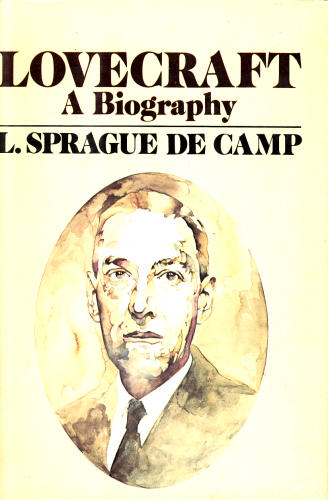 I finished rereading L. Sprague De Camp’s biography of HPL, Lovecraft: A Biography. Reading it some 25 years later is an interesting and somewhat refreshing experience. De Camp has been often criticized by HPL fans for his frank and almost drumming investigation of HPL’s xenophobia and other potential psychosis. Many feel he hurt HPL’s reputation by calling attention to what can easily be perceived as elitism, racism, antisemitism, etc., but in examining the text fully I think De Camp successfully shows that his extreme dislikes and even rages against Jews, Blacks, Catholics, Italians, Celts, Asians, and in fact anyone not of New England Protestent stock is truely a mental disease which he struggled with up to the end of his life. I think the text and quotations of Lovecraft’s letters bear out he had a mental illness, classed as xenophobia which represents a patent fear in general of anyone not of his own race, family, or tribe. To HPL’s credit, and De Camp brings this out, HPL repudiated many of these beliefs. After all, he married a Jew and numbered more than one Jew among his closest friends.
I finished rereading L. Sprague De Camp’s biography of HPL, Lovecraft: A Biography. Reading it some 25 years later is an interesting and somewhat refreshing experience. De Camp has been often criticized by HPL fans for his frank and almost drumming investigation of HPL’s xenophobia and other potential psychosis. Many feel he hurt HPL’s reputation by calling attention to what can easily be perceived as elitism, racism, antisemitism, etc., but in examining the text fully I think De Camp successfully shows that his extreme dislikes and even rages against Jews, Blacks, Catholics, Italians, Celts, Asians, and in fact anyone not of New England Protestent stock is truely a mental disease which he struggled with up to the end of his life. I think the text and quotations of Lovecraft’s letters bear out he had a mental illness, classed as xenophobia which represents a patent fear in general of anyone not of his own race, family, or tribe. To HPL’s credit, and De Camp brings this out, HPL repudiated many of these beliefs. After all, he married a Jew and numbered more than one Jew among his closest friends.
I think some other biographers have often tried to whitewash the negative traits of HPL’s personality, either by excusing him as being from a different era, or suggesting that HPL simply made racist remarks purely for shock value, which he did not truly believe. I think De Camps research, collected information from friends, and HPLs own words shows how the insular and isolated developed opinions and beliefs that were both unsupported by fact, but obviously generated great fear in the insecure writer from Providence.
De Camp also makes much of discussing Lovecraft’s failures of responsibility, including failures to his wife, his craft, and ultimately himself. As working writer who made his career in fantastic fiction, De Camp, is very unsympathetic and unwilling to forgive how HPL choose to live his life (e.g. that HPL fled from the possibilities of being a professional author and instead took on the pose of an impoverished aristocrat, who merely wrote fiction as a “amature” hobby.)
Here, I feel that De Camp is a little harsh and unforgiving that HPL did not make the choices that would seem to have led HPL to write more and be more successful. But that assumes that HPL was destined or responsible to living a conventional life of a professional author and that his choices should have been De Camp’s. HPL lived a unique life of his own making, fraught with the poverty, errors, joys, and successes he chose to live. De Camp’s biography makes that abundantly clear.
